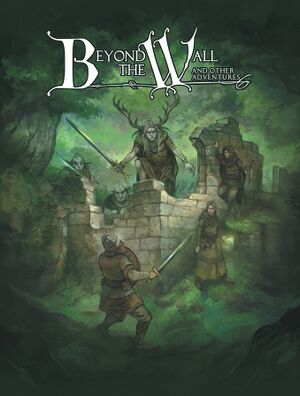Beyond the Wall and Other Adventures: Difference between revisions
Jump to navigation
Jump to search
| Line 23: | Line 23: | ||
==Supplements== | ==Supplements== | ||
Two supplements are available: | Two supplements are available: | ||
* ''Further Afield'' adds a bunch of helpers for the more traditional campaign-based play. Features optional rules for | * ''Further Afield'' adds a bunch of helpers for the more traditional campaign-based play. Features optional rules for combat, magic items creation, traveling, as well as new spells and price charts for common items. Also introduces Threats, kind of major opponents for sandbox campaigns. | ||
*''Heroes Young and Old'' is a compilation of Playbooks along some new spells, magic items, traits and monsters. | *''Heroes Young and Old'' is a compilation of Playbooks along with some new spells, magic items, traits and monsters. | ||
[[Category:Roleplaying]] | [[Category:Roleplaying]] | ||
Revision as of 23:53, 10 May 2022
| Beyond the Wall and Other Adventures | ||
|---|---|---|
 |
||
| RPG published by Flatland Games |
||
| Authors | John Cocking Peter S. Williams |
|
| First Publication | 2014 | |
Beyond the Wall and Other Adventures is an OSR game by Flatland Games with a focus on being able to play with little to no prep, though it's perfectly playable in a more traditional way.
Character creation
To create a character, you can either chose a class between Warrior, Rogue and Mage, and assign your ability scores the usual way, or use a Playbook. In a Playbook you will find several tables with questions you or other players will answer, creating places, NPCs, and relations to other PCs in the process (thus the zero prep).
Magic
Beyond the Wall is notable for having relatively low-level magic when compared to other OSR games. Magic is ranked according to three categories:
- Cantrips are minor feats of magic that can be casted at will, such as producing light, etc. They can fail though, at which point they can exhaust the mage’s magic power for a day or go out of control (the forementionned light spell would produce darkness instead, for example).
- Spells are the simplest and most reliable form of magic, a mage may cast a number of spells per day equal to its level. They include immunity to fire, feather fall, etc.
- Rituals are the most powerful form of magic, but requires a lot of preparation. Each ritual require specific ingredients and a few hours to be cast. Things such as conjuring a storm or hurling a gigantic fireball are considered as rituals.
Supplements
Two supplements are available:
- Further Afield adds a bunch of helpers for the more traditional campaign-based play. Features optional rules for combat, magic items creation, traveling, as well as new spells and price charts for common items. Also introduces Threats, kind of major opponents for sandbox campaigns.
- Heroes Young and Old is a compilation of Playbooks along with some new spells, magic items, traits and monsters.